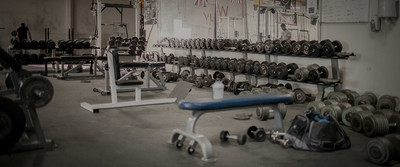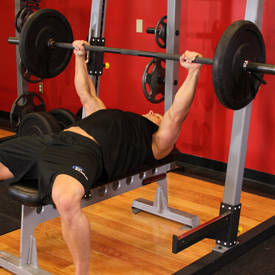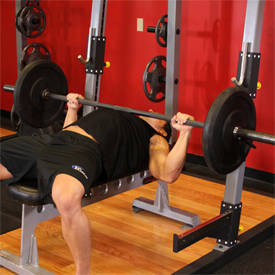Do you have stubborn muscle groups that refuse to grow no matter how hard you train them? Do you find it impossible to get a good pump in one of your muscles? Well the answer is here, and it's been inside you all along!
Although weight lifting is perceived by many people to be strictly physical training, there are many important psychological aspects to it. Here we're going to break down arguably the most important psychological aspect of bodybuilding.
Staying focused in the gym isn't always easy, especially if you're pulling a late-night workout or you've had a stressful day. Ever feel like you're just going through the motions? Maybe your mind starts to wander and your thoughts drift to your work or something in the news. You probably don't realize it, but you're missing out on one of the most important secrets to success, the mind-muscle connection.

Staying focused in the gym isn't always easy, especially if you've had a stressful day.
What Is The Mind-Muscle Connection?
As you know, movement is controlled by the brain. The first step towards muscular contraction is a signal sent by the brain to your muscles telling them to contract. You might say that the mind-muscle connection (MMC) occurs at something called the "neuromuscular junction". This is where the mind meets the body. The brain releases a chemical neurotransmitter called "acetylcholine" to communicate with muscles in the body.
When acetylcholine is released at the neuromuscular junction it crosses the "synapses" (the tiny space that separates the nerve from the muscle) where it binds to receptors on the surface of muscle fibers. Voila, muscle contraction.
The more you can improve this communication, the more muscle fibers you will recruit. A single muscle head is made up of many individual muscle fibers. By improving your MMC you are actually increasing the number of muscle fibers being recruited when you perform a lift. This results in a better quality muscle contraction and better workout.

The more you can improve this communication, the more muscle fibers you will recruit.
Why Is MMC So Important?
In order to understand why the MMC is so important, you have to understand the difference between primary and secondary movers. The primary mover is the muscle that is intended to do the most work in moving a weight. Secondary movers are the muscles that support the primary mover.
So for example, the pectoralis major is the primary mover in the bench press and the triceps and deltoids are secondary movers. You will also hear the primary mover referred to as the "target" muscle. The primary mover, or target muscle is the muscle you're trying to isolate and pump up during a given exercise.
There are many muscles in the body that are inherently difficult to work. Usually the smaller ones that aren't responsible for much heavy lifting (like your posterior deltoids). Someone who doesn't lift weights probably doesn't even know they have a rear head on their deltoids, because it's so small and inconspicuous. But muscles like this one are extremely important for building a quality physique. In order to develop muscles like your posterior deltoids you must be able to isolate them and this requires a strong MMC.
When you're in the middle of a set, what's going through your mind? Are you simply trying to force out as many reps as you can? If this is you, I've got some tips below to help you develop your MMC and maximize your gains.
You should be seriously committed to feeling each and every rep in your target muscles. A lot of people feel like they have something to prove in the gym and are compelled to lift with their egos. Conquering your ego is something that you must do if you want to get serious about bodybuilding. You might be benching 275 lbs, but if you're not maximizing the work done by your chest, you're wasting a whole lot of potential. You might even be setting yourself up for failure.
Too many people get obsessed with how much weight they're pushing rather than how much work their muscles are actually doing. Your muscles don't grow because of the weight moving up and down. They grow because they're forced to contract by acting on that weight. If you maximize the force placed on your target muscles you will maximize your gains, and that's what it's all about: maximizing the work done by your target muscles. Not maximizing the weight moving up and down, this is secondary.
Think of it this way, you bench press 250lbs for 8 reps. But because your MMC is poor, your Triceps and Deltoids are pushing much of that weight, so your chest might only be bearing 60% of the load. In other words, your chest is being recruited to push 150lbs (60% of 250lbs).
Instead, try lowering the weight and focusing more on your MMC. Say you reduce the weight to 220lbs for 8 reps; this time because of your improved MMC your chest is bearing 80% of the load. Now you're pushing 176lbs (80% of 220) with your target muscle, so your chest is actually doing more work. If you have to lower the weight in order to get a good quality muscle contraction, then do it. Sometimes less is actually more.
Simply moving more weight doesn't mean that your target muscles are doing more work. If you're only concerned with lifting the weight at all costs (sometimes by twisting and wrenching your body in order to force out that last rep), not only are your target muscles getting the short end of the stick, but this increases your risk of injury. If you consistently train like this your brain will never learn how to properly communicate with your muscles and your MMC can actually begin to get worse. You should therefore be focusing your mental energy on contracting your target muscles rather than on moving the weight.
If you want to start making serious gains you've got to learn to make every single rep count. There is a world of difference between simply getting 10 reps and actually doing 10 reps. Every repetition that you don't feel is a repetition wasted.
Helpful Tips
Here are 4 tips I have found to be effective for developing a strong Mind-Muscle Connection.
1. Check Your Ego At The Door
One of the most common reasons why people fail to develop a proper Mind-Muscle Connection is because they are obsessed with pushing more and more weight. Forget about how much weight you're pushing, concentrate instead on the quality of each repetition.

Forget about how much weight you're pushing, and concentrate on the quality of each repetition.
2. Warm-Up Sets
Try doing a few warm-up sets (high reps of 15-20) with a very low weight. Close your eyes and concentrate on your target muscles. Concentrate on "squeezing" the weight and pause for a moment at the point of maximum contraction. If you're worried about wasting energy before your working sets, try this on an off day.
3. Perform The Exercise Very Slowly
You will probably want to use a lighter weight than normal for this. Take 4 or 5 seconds for each of the concentric and eccentric parts of the repetition. Again it helps to pause for a moment at the point of max contraction.
4. Flex Your Target Muscles In Between Sets
This forces additional blood into your muscles, pumping them up further. You are more aware of your muscles when they're fully pumped, which makes it easier to mentally isolate them.
Conclusion
Simply put, you can train as hard as you want but if your mind-muscle connection is not fully developed you will never reach your full potential. Getting into the "zone" in sports is one of the toughest things to do. We often hear athletes in sports from golf to football talking about the "zone", and for good reason.
Athletic performance is enhanced when you are able to mentally block out external pressures and distractions. Try not to let your mind wander in the gym. You're not there to socialize (at least you shouldn't be), you're there to workout.
Training hard is important, and of course everybody wants to lift big weights. Letting go of your ego can be a difficult thing to do. Nevertheless, if you want to make serious gains it's something that you absolutely have to do. There's no point in working your butt off if you're not working your muscles effectively.
Think of all that wasted energy. We all want to be able to brag about how much we lift; it's a part of the game. But if you never master the mind-muscle connection you're never going to make the big gains you dream about. It's time to start training smarter not harder.



